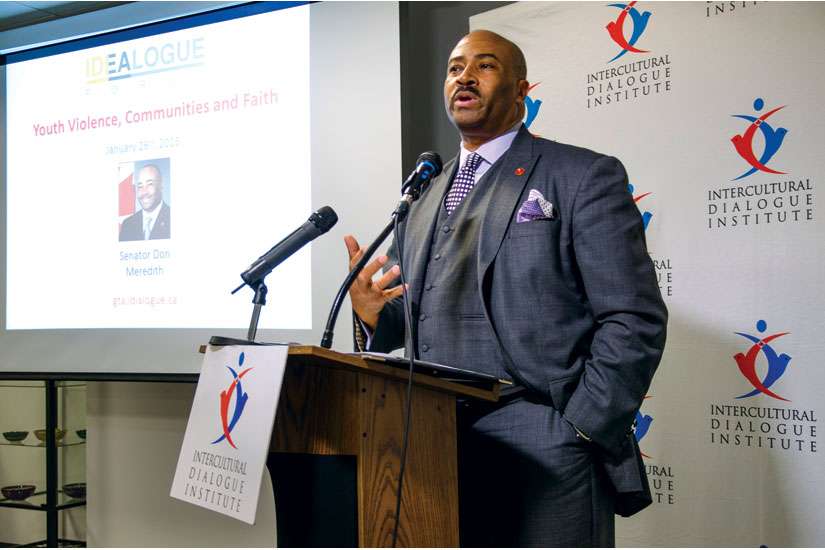On Jan. 26 Meredith, a volunteer preacher at the Pentecostal Praise Centre Ministries in Maple, Ont., spoke to about 50 people who attended a midday lecture hosted by the Intercultural Dialogue Institute in Toronto’s downtown core.
“The faith community is a sleeping giant,” said Meredith. “I want our faith leaders to step up and be more engaging with the youth of this city.”
As a youth growing up in the troubled Jane and Finch area of Toronto, Meredith said it was parish-run activities such as ball hockey games that kept him out of trouble. Not only did this give Meredith and his peers something to do, it also allowed the parish community to “actually monitor and influence them.”
“Little interventions we can make to ensure the success of our young people is so critical,” said Meredith.
But most faith leaders today have turned away from holding such activities, leaving many children to wander astray, he’s found. And with more and more children growing up in single-parent families, Meredith said it is more critical than ever that “surrogate mothers and fathers” within church communities adopt these youth before gangs do.
“Young people, when they find themselves in a hopeless situation, are then susceptible to gangs,” he said. “(So) how do you get the faith community more involved with being surrogate mothers and fathers to these children who are wayward? That is why we started GTA Alliance to look at how pastors, how faith leaders, could be more engaged and be there to support these young people.”
Information compiled by Statistics Canada in 2013 shows about one-fifth of Canadian youth live in single-parent families.
“We need to look at how we play what role we play” as a faith community, he said. “We have to be better role models.”
Meredith’s wife Michelle, a retired educator with the York District School Board and current director of education for the non-profit GTA Alliance, said she’s seen many students lured down the wrong path through a combination of loneliness and technology.
“Kids have told me about web cams, that they’re talking to strangers because they are lonely,” she said, adding that some were as young as 12. “There is a stranger in the home and that is a strong influence. As faith leaders ... we have to go back to that village mentality.”
In addition to increasing engagement, encouragement and empowerment, “the triple E,” at their local parish or dioceses, faith leaders need to develop a Canada-wide community of support by communicating coast-to-coast.
“This problem isn’t just Toronto’s problem, this is a Canada-wide problem,” because troubled youth tend to move around after developing a bad reputation, said Meredith.
“I’ve been to Preston, N.S., and there is an issue there too. I’ve gone to Saskatchewan, I’ve gone to Montreal, right in Ottawa we see the problems that are brewing amongst our youth.
“We need to find ways that we are touching the lives of our youth otherwise we are consistently going to have a major problem,” he said.


